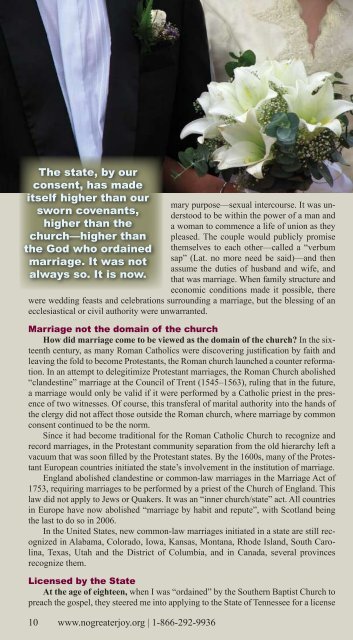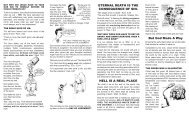Download the PDF - No Greater Joy Ministries
Download the PDF - No Greater Joy Ministries
Download the PDF - No Greater Joy Ministries
You also want an ePaper? Increase the reach of your titles
YUMPU automatically turns print PDFs into web optimized ePapers that Google loves.
The state, by our<br />
consent, has made<br />
itself higher than our<br />
sworn covenants,<br />
higher than <strong>the</strong><br />
church—higher than<br />
<strong>the</strong> God who ordained<br />
marriage. It was not<br />
always so. It is now.<br />
10 www.nogreaterjoy.org | 1-866-292-9936<br />
mary purpose—sexual intercourse. It was understood<br />
to be within <strong>the</strong> power of a man and<br />
a woman to commence a life of union as <strong>the</strong>y<br />
pleased. The couple would publicly promise<br />
<strong>the</strong>mselves to each o<strong>the</strong>r—called a “verbum<br />
sap” (Lat. no more need be said)—and <strong>the</strong>n<br />
assume <strong>the</strong> duties of husband and wife, and<br />
that was marriage. When family structure and<br />
economic conditions made it possible, <strong>the</strong>re<br />
were wedding feasts and celebrations surrounding a marriage, but <strong>the</strong> blessing of an<br />
ecclesiastical or civil authority were unwarranted.<br />
Marriage not <strong>the</strong> domain of <strong>the</strong> church<br />
How did marriage come to be viewed as <strong>the</strong> domain of <strong>the</strong> church? In <strong>the</strong> sixteenth<br />
century, as many Roman Catholics were discovering justification by faith and<br />
leaving <strong>the</strong> fold to become Protestants, <strong>the</strong> Roman church launched a counter reformation.<br />
In an attempt to delegitimize Protestant marriages, <strong>the</strong> Roman Church abolished<br />
“clandestine” marriage at <strong>the</strong> Council of Trent (1545–1563), ruling that in <strong>the</strong> future,<br />
a marriage would only be valid if it were performed by a Catholic priest in <strong>the</strong> presence<br />
of two witnesses. Of course, this transferal of marital authority into <strong>the</strong> hands of<br />
<strong>the</strong> clergy did not affect those outside <strong>the</strong> Roman church, where marriage by common<br />
consent continued to be <strong>the</strong> norm.<br />
Since it had become traditional for <strong>the</strong> Roman Catholic Church to recognize and<br />
record marriages, in <strong>the</strong> Protestant community separation from <strong>the</strong> old hierarchy left a<br />
vacuum that was soon filled by <strong>the</strong> Protestant states. By <strong>the</strong> 1600s, many of <strong>the</strong> Protestant<br />
European countries initiated <strong>the</strong> state’s involvement in <strong>the</strong> institution of marriage.<br />
England abolished clandestine or common-law marriages in <strong>the</strong> Marriage Act of<br />
1753, requiring marriages to be performed by a priest of <strong>the</strong> Church of England. This<br />
law did not apply to Jews or Quakers. It was an “inner church/state” act. All countries<br />
in Europe have now abolished “marriage by habit and repute”, with Scotland being<br />
<strong>the</strong> last to do so in 2006.<br />
In <strong>the</strong> United States, new common-law marriages initiated in a state are still recognized<br />
in Alabama, Colorado, Iowa, Kansas, Montana, Rhode Island, South Carolina,<br />
Texas, Utah and <strong>the</strong> District of Columbia, and in Canada, several provinces<br />
recognize <strong>the</strong>m.<br />
Licensed by <strong>the</strong> State<br />
At <strong>the</strong> age of eighteen, when I was “ordained” by <strong>the</strong> Sou<strong>the</strong>rn Baptist Church to<br />
preach <strong>the</strong> gospel, <strong>the</strong>y steered me into applying to <strong>the</strong> State of Tennessee for a license

















